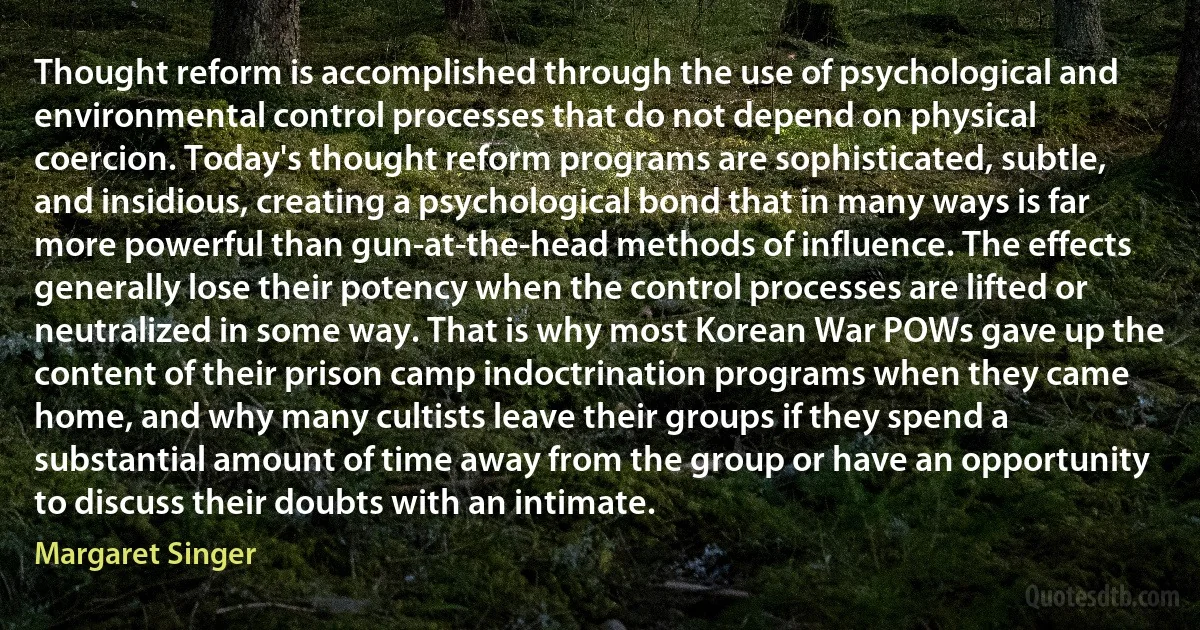
Thought reform is accomplished through the use of psychological and environmental control processes that do not depend on physical coercion. Today's thought reform programs are sophisticated, subtle, and insidious, creating a psychological bond that in many ways is far more powerful than gun-at-the-head methods of influence. The effects generally lose their potency when the control processes are lifted or neutralized in some way. That is why most Korean War POWs gave up the content of their prison camp indoctrination programs when they came home, and why many cultists leave their groups if they spend a substantial amount of time away from the group or have an opportunity to discuss their doubts with an intimate.
Margaret SingerRelated topics
came coercion content control far home indoctrination leave lose opportunity potency prison spend substantial thought time use war way korean waysRelated quotes
Avoiding all control, I spread out sheets of white paper or canvas in the nature. For some time they stay in the grass, in the rushes of river, in the meadows or among the rocks. Nature registers its presence, covering the surface of the paper with colors, forms and tracks. This process is controlled by a number of agents; such as space and time, substance and causality. It is governed by nature's intensity. It does not, depend on man's interference. Nature is the greatest and most admirable creator, and unlike logic it doesn't fail. The artist obligation is not to shape - handicraft, but to understand the riddles of reality. In such conception of Art there lies, as in the Universe itself, an immense richness, and a countless variety of forms.

Jacek Tylicki
We no longer have political movements. While thousands of us may come together for a rally or march, we are bound together on such occasions by a single shared interest. Any effort to convert such interests into collective goals is usually undermined by the fragmented individualism of our concerns. Laudable goals-fighting climate change, opposing war, advocating public healthcare or penalizing bankers-are united by nothing more than the expression of emotion. In our political as in our economic lives, we have become consumers: choosing from a broad gamut of competing objectives, we find it hard to imagine ways or reasons to combine these into a coherent whole. We must do better than this.

Tony Judt
Centuries ago, sailors on long voyages used to leave a pair of pigs on every deserted island. Or they'd leave a pair of goats. Either way, on any future visit, the island would be a source of meat. These islands, they were pristine. These were home to breeds of birds with no natural predators. Breeds of birds that lived nowhere else on earth. The plants there, without enemies they evolved without thorns or poisons. Without predators and enemies, these islands, they were paradise. The sailors, the next time they visited these islands, the only things still there would be herds of goats or pigs. .... Does this remind you of anything Maybe the ol' Adam and Eve story .... You ever wonder when God's coming back with a lot of barbecue sauce.

Chuck Palahniuk
Consider your state of mind-your consciousness-before going to sleep. This is extremely important. Make a commitment to spend at least fifteen minutes spiritualizing your consciousness before going to bed. Read something spiritual, listen to spiritual discourse or music, or engage in discussion on a spiritual topic. Push aside the chaos and confusion that were a part of your day, and focus on spiritual reality. In this way, you will prepare yourself for the next six to eight hours of sleep. If you allow yourself to focus spiritually, you will provide less of an opportunity for negative elements to enter your dreams. You can then benefit most from your sleeping state.

Bhakti Tirtha Swami
If you have weapons, take them home; if you do not have them, please do not seek to get them. We cannot solve this problem through retaliatory violence. We must meet violence with nonviolence. Remember the words of Jesus: «He who lives by the sword will perish by the sword.» We must love our white brothers, no matter what they do to us. We must make them know that we love them. Jesus still cries out in words that echo across the centuries: «Love your enemies; bless them that curse you; pray for them that despitefully use you.» This is what we must live by. We must meet hate with love. Remember, if I am stopped, this movement will not stop, because God is with the movement. Go home with this glowing faith and this radiant assurance.

Martin Luther King Jr.
